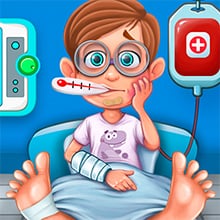
Hospital Games
Discover 23 amazing hospital games. Play for free and have fun!
About Hospital Games
What Are Hospital Games?
Hospital games are a genre of video games that simulate the management and operation of medical facilities. These games offer players a chance to experience the complexities of running a hospital, from handling patient care to managing resources and staff. They can vary widely in terms of gameplay and realism, but they generally focus on aspects related to healthcare and medical management.
Characteristics Of Hospital Games
Hospital games are characterized by several key features that define their gameplay and appeal. These characteristics encompass the game's focus, mechanics, and overall experience, providing a comprehensive look at what makes hospital games unique and engaging.
Management and Strategy Focus
A central characteristic of hospital games is their focus on management and strategy. Players are tasked with overseeing various aspects of hospital operations, such as staffing, budgeting, and resource allocation. The strategic element requires players to make informed decisions to optimize the efficiency of the hospital, manage patient flow, and address unexpected challenges. This often involves balancing competing priorities and adapting strategies to meet the evolving needs of the hospital and its patients.
Realistic or Thematic Simulation
Hospital games often feature a degree of simulation that can range from highly realistic to more thematic or stylized representations of medical care. Realistic games might include detailed depictions of medical procedures, equipment, and hospital protocols, offering an authentic experience of healthcare management. In contrast, more thematic or stylized games may focus on creating a fun and engaging atmosphere, using imaginative scenarios and exaggerated elements to enhance the gameplay experience.
Patient Care and Diagnosis
Patient care is a core element of hospital games. Players are typically responsible for diagnosing and treating a variety of medical conditions, which can range from common ailments to complex cases. The gameplay often involves analyzing symptoms, conducting tests, and implementing treatment plans. This aspect of the game highlights the importance of effective diagnosis and treatment, and can be a significant part of the overall challenge and satisfaction of the game.
Resource Management
Effective resource management is crucial in hospital games. Players must allocate resources such as staff, equipment, and finances to ensure the smooth operation of the hospital. Managing these resources involves making strategic decisions about where to invest and how to address shortages or surpluses. Resource management adds a layer of complexity to the gameplay, requiring players to balance short-term needs with long-term goals.
Staff and Facility Management
Hospital games typically include elements of staff and facility management. Players may need to hire and train medical personnel, assign tasks, and address staff needs and morale. Additionally, managing the physical facility, such as upgrading equipment, expanding hospital wings, or maintaining cleanliness, is often a key part of the game. This aspect emphasizes the importance of effective leadership and organizational skills in running a successful hospital.
Challenges and Scenarios
Hospital games often present players with a variety of challenges and scenarios that test their management skills. These challenges can include medical emergencies, disease outbreaks, financial constraints, and patient satisfaction issues. The dynamic nature of these scenarios keeps the gameplay engaging and requires players to adapt their strategies to overcome obstacles and achieve success.























